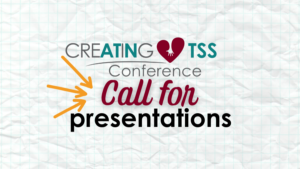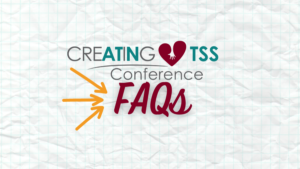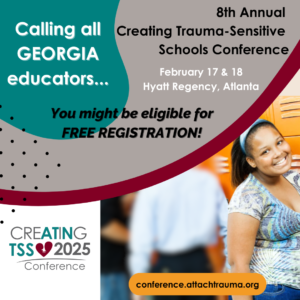- Sunday, February 19, 2023, Hilton Americas in Houston, TX.
- 3-hour deep dives available both in the morning and afternoon.
- Academy Day starts at 8:30am and ends at 5:45pm depending on the sessions you attend. Central Time for all In-Person schedules.
- Meals are on your own.
- An opportunity to participate in a 2-hour Poverty Simulation is also available.
- Attending Academy Day is only $100, a separate (additional) charge from the 2023 CTSS In-Person Conference registration.
- Must Choose Sessions at purchase. It is possible to do 1 Session in the morning, 1 Session in the afternoon, and the #2 Poverty Session.
- These are live, in-person sessions. They will not be recorded or available virtually.
- Space is limited. When they are full, they will not be available to purchase.
- CEUs should be available.
Session 1: Sunday, Feb 19, 2022 8:30 am - 11:30 am (3 hours) Choose 1
Limit: 200
Jen Alexander, M.A., NCC, SB-RPT
Trauma-sensitive educational practices are complex. In fact, building trauma-sensitive learning environments often gets messier the more we understand and apply trauma-informed practices within real life situations at school. When do we lean into nurture and when do we lean into challenge? In this interactive seminar with Ms. Jen, an experienced educator, author, and consultant, you’ll learn to apply a trauma-informed lens to your relationships with students—especially those who present with behavioral challenges. Together, we’ll explore what attunement looks like in practice at school so that you will be able to hold high expectations within responsive relationships. This will help disrupt deficit framing and other practices that cause harm within educational campuses. Specifically, participants will learn practical strategies for improving safety, empowering youth and colleagues, and ensuring access to ambitious learning. Come dive deeper into the layers of this most important work and leave with clear next steps to improve your professional practices. It’s all about helping *all* students and staff feel safe, be connected, get regulated, and learn!
As a result of this seminar, participants will be able to…
- Share at least one of their professional strengths that aligns with what they already know about trauma-sensitive practices.
- Understand the differences between traditional behavior modification techniques and a trauma-informed approach to understanding and meeting the behavioral needs of students.
- Apply a trauma- informed lens to at least one relationship with a student who presents with behavioral challenges.
- Identify a *good reason* for one student’s behavior, and link that reason to the student’s specific needs (think not yet developed skills).
- Set a professional goal related to deepening trauma-sensitive practices by identifying practical next steps for both nurture and challenge within one’s relationship with the identified student.
- Explore communication strategies that will enhance dialogue between colleagues as teams #NoticeTheNeed #MeetTheNeed to support ambitious behavioral or academic growth for everyone at school.
Topics: Relational & Attachment Strategies, Classroom Strategies, Special Education
Level: Advanced
Limit: 200
Jessica Sinarski, LPCMH
This lively session will take a fresh look at the root of “bad behavior” – in students AND staff – and the brain processes involved. Participants will discover new tools based on the latest neuroscience to increase learning opportunities, reduce negative behavior, and improve school culture. Whether you’re a brain novice or well-versed in research about Adverse Childhood Experiences (ACEs) and the brain, you won’t want to miss this hope-filled learning experience.
As a result of this seminar, participants will be able to…
- Identify Turnaround for Children’s well-researched foundational “Building Blocks for Learning” (attachment, stress management and self-regulation).
- Translate the ACEs research to the user-friendly BraveBrains model of brain and behavior.
- Discuss the parts of the brain involved in common frustrating behaviors.
- Practice at least 5 ways to increase “Upstairs Brain” functioning.
- Apply this knowledge to increase positive student and staff engagement.
- Design a plan for changing or augmenting current strategies with new tools.
Topics: Relational & Attachment Strategies, Neuroscience/Regulation, Classroom Strategies
Level: Introductory
This workshop has been rated a “Start Here” choice for 1st time conference attendees.
Limit: 200
Stephanie Lange
Being an Ally to LGBTQ+ students (especially if you are heterosexual) can be challenging and complicated in the school setting. This session will help attendees understand the issues that LGBTQ+ students face, help attendees explore and understand their own bias, provide attendees with strategies to offer support to students, discuss strategies for intervening when a bias incident is witnessed, strategize best practices to educate staff and create inclusive policies, how to communicate with families that are not supportive, role play common scenarios in school that involve LGBTQ+ student issues, and much more. In addition, we will be able to understand how making our school inclusive for LGBTQ+ students improves school climate and staff morale, improving overall sense of belonging and safety.
As a result of this seminar, participants will be able to…
- Understand the issues that LGBTQ+ students face.
- Explore and understand their own bias.
- Access strategies to offer support to students.
- Discuss strategies for intervening when a bias incident is witnessed
- Strategize best practices to educate staff and create inclusive policies,
- Communicate with families that are not supportive.
- Analyze common scenarios in school that involve LGBTQ+ student issues through this new lens.
Topics: Leadership & Equity
Level: Advanced
Limit: 35
Joe Brummer
This 3-hour introductory workshop will introduce participants to circle process for
Tier 1 relationship building. We will explore the elements of a circle, guidelines for
circle, and ways to use circle process to build relationships with staff, students,
and families in our school community. We will troubleshoot common circle
roadblocks and offer resources to deepen our practice. This will be a very
interactive workshop where we can play games and build community with other
conference attendees.
- Participants will learn the elements and stages of circle process.
- Participants will experience the power of connection a circle can bring using games and activities.
- Participants will learn to use the talking piece as a way of facilitating difficult conversations.
- Participants will explore the connections between circle process and current neuroscience about nervous system regulation.
- Participants will explore 3 main types of circle: Community Building, Harm, and Academic Circles.
- Participants will explore the connection between circle process and restorative practices.
Topics: Restorative Practices
Level: Introductory
Session 2: Sunday, Feb 19, 2022 12:30 - 3:00 (3 hours) Choose 1
Limit: 200
Melissa Sadin EdD, MEd, MAT
Join this engaging and enlightening workshop where we will explore the tug-of-war between behavior modification and trauma-informed education. We will review the journey to current behavior modification practices, as well as an understanding what it is to be trauma-informed. Participants will understand why traditional behavior modification practices are ineffective at best and harmful at worst. There is, however, hope for blending traditional behavior modification with trauma-informed education. Strategies for bringing together these two seemingly diverse theoretical practices will be shared. Participants will have an opportunity to ask questions about their specific programs and will work in small groups to generate ideas to bring back to their schools.
- Participants will understand the theoretical background to behavior modification practice is currently being used in schools.
- Participants will understand the components of trauma informed education.
- Participants will understand the potential harm of behavior modification when used with children with developmental trauma.
- Participants will identify a place where behavior modification and trying to form dedication can coexist.
- Participants will recognize trauma-informed functional behavioral assessment.
- Participants will reflect on their own practice.
Topics: Relational & Attachment Strategies, Special Education, Classroom Strategies
Level: Advanced
Limit: 200
Megan Maynard, MA, RP
This experiential workshop emphasizes the role of the “self” in supporting social-emotional learning practices for students. From an interpersonal neurobiology perspective, participants will explore how their own childhood and life experiences
influence their well-being, teacher-student relationships, and classroom pedagogy.
Drawing on attachment theory and neuroscience, this workshop will provide an opportunity for self-reflexive practice and the development of strategies to enhance participant well-being, and teacher-student relationships (including co-regulatory practices). This workshop emphasizes the important role of the well-being of educators in supporting children and youth impacted by trauma and disrupted attachment. Participants will develop a foundation of both adult and child attachment theory, and an understanding of the link between attachment and trauma. Drawing on theoretical foundations, participants will engage in self-
reflexive personal journaling practices to enhance self-insight and personal well-being. Further, participants will develop skills in enhancing teacher-student relationships and student social-emotional learning through the application of insight into the self and attachment theory. The workshop will open and close with experiential activities to enhance personal well-being.
- Participants will be able to identify the role of early attachment relationships for both children impacted by trauma, and themselves, based on both child attachment and adult attachment theories.
- Participants will self-reflect and self-identify their own adult attachment patterns and schemas while exploring their own implicit emotional experiences, cognitions, and biases as they present inside the educational setting.
- Participants will develop an understanding of the neuropsychology of attachment, and the relation between attachment and trauma.
- Participants will engage in self-reflexive journaling practices to reflect on the impact of their own childhood and life experiences. Further, participants will gain awareness, through independent journalling, of how childhood and life experiences influence teacher-student relationships and classroom pedagogy.
- Participants will engage in experiential activities to promote personal well-being from a trauma-informed perspective (i.e. journaling,mindfulness of the self, self-compassion, self-validation, self-regulation/polyvagal interventions).
- Participants will be introduced to tangible strategies to enhance student social-emotional learning, self-regulation, and teacher-student relationships through an attachment and neurobiology lens with an emphasis on the role of personal well-being.
Topics: Wellness/Self-Care, Relational & Attachment Strategies, Neuroscience/Regulation Level: Advanced
Limit: 200
Stacy York Nation, LCSW
This workshop defines childhood trauma, gives detailed information on how the brain is impacted by that trauma, and discusses strategies that can be used in the classroom. Participants will leave understanding emotional regulation, sequential brain development, and immediate strategies to co-regulate, build relationship, and repair with students.
Participants will spend the first half of the workshop defining trauma and understanding how the brain develops. We will discuss the difference between chronological development and emotional development. We will look at how educators can meet the needs of their students based on science. The second half of the workshop will take educators through real-life strategies that they can use immediately, including: calming the sensory system, utilizing heart rate to understand the students’ stress responses, learning how to talk about feelings from a concrete place vs an abstract place.
- Define trauma.
- Understand emotional regulation, including co-regulation.
- Understand the sequential development of the brain and the impact of trauma on that development.
- Identify strategies that are based in science and useful for regulating students.
- Take participants through experiential exercises that help them understand the sensory system and its impact on classroom management.
- Assist participants in developing their own wellness plan.
Topics: Classroom Strategies, Neuroscience/Regulation, Relational & Attachment Strategies
Level: Introductory

This workshop has been rated a “Start Here” choice for 1st time conference attendees.
Limit: 35
Joe Brummer
This 3-hour introductory workshop will introduce participants to circle process for Tier 1 relationship building. We will explore the elements of a circle, guidelines for circle, and ways to use circle process to build relationships with staff, students, and families in our school community. We will troubleshoot common circle roadblocks and offer resources to deepen our practice. This will be a very interactive workshop where we can play games and build community with other conference attendees.
- Participants will learn the elements and stages of circle process.
- Participants will experience the power of connection a circle can bring using games and activities.
- Participants will learn to use the talking piece as a way of facilitating difficult conversations.
- Participants will explore the connections between circle process and current neuroscience about nervous system regulation.
- Participants will explore 3 main types of circle: Community Building, Harm, and Academic Circles.
- Participants will explore the connection between circle process and restorative practices.
Topics: Restorative Practices
Level: Introductory
Poverty Simulation #1: Sunday, Feb 19, 2022 1:00 - 3:00 pm (this conflicts with Session 2 above so choose #2 if you’re also attending a Session 2 Seminar)
Essdack’s Over Poverty Paradigm is an experiential session where participants can learn what it’s like to live in poverty for one month – simulated in four 15-minute weeks. The results are a new understanding of why families on the lower economic scale do the things that they do. The simulation is built to be offered in communities and schools to initiate the paradigm shifts necessary to activate great generational and systemic change.
Topics: Equity, Leadership
Level: Introductory
Poverty Simulation #2: Sunday, Feb 19, 2022 3:45 -5:45 pm
Essdack’s Over Poverty Paradigm is an experiential session where participants can learn what it’s like to live in poverty for one month – simulated in four 15-minute weeks. The results are a new understanding of why families on the lower economic scale do the things that they do. The simulation is built to be offered in communities and schools to initiate the paradigm shifts necessary to activate great generational and systemic change.
Topics: Equity, Leadership
Level: Introductory


